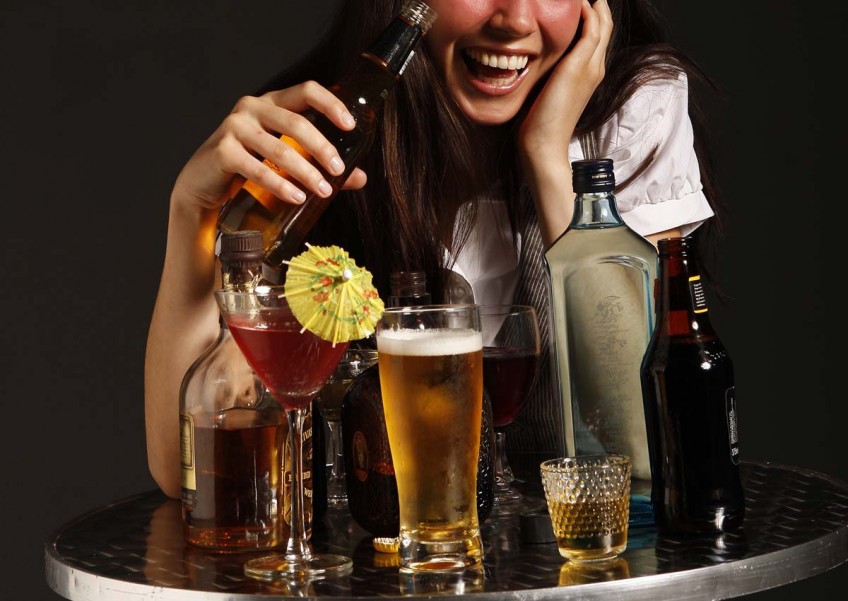Even moderate alcohol consumption shrinks your brain, study suggests

Those of you who gave up alcohol – or tried to – for Dry January may want to consider recommitting to it. The latest research suggests even moderate alcohol consumption – drinking just a few glasses of wine or beer a week – is associated with a reduction in brain matter.
A study of 36,000 adults in the UK has shown that going from drinking one unit of alcohol a day to two a day is associated with the equivalent of ageing by two years.
This is the difference between one half pint (284ml in UK, 296ml in US) of beer a day and a pint of beer, one small glass of wine a day and two, and one measure of spirits a day and two.
People who drink more heavily have even greater changes in brain structure and size, which are associated with cognitive impairments.
The study led by US researchers at the University of Pennsylvania concluded that having more alcohol was linked to having less brain matter .
The results, published in Nature Communications , found that 50-year-olds who increased their drinking from two to three alcohol units a day were causing their brain to age by three-and-a-half years.
“The fact that we have such a large sample size allows us to find subtle patterns, even between drinking the equivalent of half a beer and one beer a day,” says Gideon Nave, a study co-author.
He collaborated with colleagues Remi Daviet, now at the University of Wisconsin-Madison, and Perelman School of Medicine researchers Reagan Wetherill and Henry Kranzler.
“These findings contrast with scientific and governmental guidelines on safe drinking limits,” says Kranzler, who directs the Penn Centre for Studies of Addiction.
“For example, although the [US] National Institute on Alcohol Abuse and Alcoholism recommends that women consume an average of no more than one drink per day, recommended limits for men are twice that, an amount that exceeds the consumption level associated in the study with decreased brain volume.”
There is no official World Health Organization guidance on maximum alcohol intake, and consumption limits and recommendations vary between countries. In Hong Kong there is no set “safe” drinking limit.
Alcohol consumption in China is rising faster than anywhere else in the world . A public health review has called for a change in policy, describing current policies as “weak” compared to other countries in Asia.
Drinking has risen during the past decade, particularly among men who are more prone to risky and hazardous drinking, according to research published in Frontiers in Psychiatry .
The number of alcohol-related deaths in China increased from 484,000 to 670,000 between 2007 and 2017 and it has become the third highest behavioural risk factor in China after poor diet and smoking. Data from 302 hospitals in Beijing has also shown that the number of patients with alcoholic liver disease is increasing.
Some studies had suggested light to moderate drinking may not have an impact on the brain and could even benefit older adults. The latest research from Penn challenges these existing studies and using a larger data set concludes that even light drinking can reduce grey and white matter in the brain.
Researchers looked at brain MRIs from more than 36,000 adults aged 40 to 69 to calculate white and grey matter volume in different regions of the brain.
“Having this data set is like having a microscope or a telescope with a more powerful lens. You get a better resolution and start seeing patterns and associations you couldn’t before,” said Nave.
The team controlled for age, height, handedness, sex, smoking status, socioeconomic status, genetic ancestry, and county of residence. They also corrected the brain-volume data for overall head size.
The volunteer participants in the study had responded to survey questions about their alcohol consumption levels, from complete abstention to an average of four or more alcohol units a day.
When the researchers grouped the participants by average consumption levels, a small but apparent pattern emerged: the grey and white matter volume was smaller in those who drank more.
Going from zero to one alcohol unit did not make much of a difference in brain volume, but going from one to two or two to three units a day was associated with reductions in both grey and white matter.
“It’s not linear,” explained Daviet. “It gets worse the more you drink.” The scientists found the difference between zero and four alcoholic drinks was more than 10 years of ageing.
The authors hope to build on this research to answer additional questions related to alcohol use.
“This study looked at average consumption, but we’re curious whether drinking one beer a day is better than drinking none during the week and then seven on the weekend,” Nave said.
“There’s some evidence that binge drinking is worse for the brain, but we haven’t looked closely at that yet.”
And while the researchers underscore that their study looked only at correlations, not causations, they say the findings may prompt drinkers to reconsider how much they imbibe.
“There is some evidence that the effect of drinking on the brain is exponential. So, one additional drink in a day could have more of an impact than any of the previous drinks that day. That means that cutting back on that final drink of the night might have a big effect in terms of brain ageing,” said Daviet.












Leave a Reply